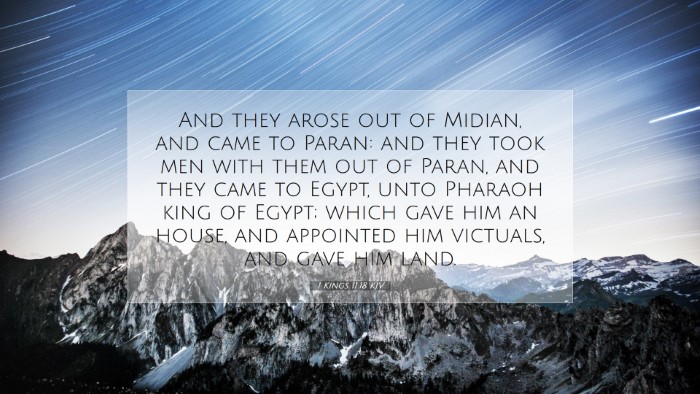Commentary on 1 Kings 11:18
Verse: 1 Kings 11:18 - "And they arose out of Midian, and came to Paran: and they took men with them out of Paran, and they came to Egypt, unto Pharaoh king of Egypt; which gave him an house, and appointed him provisions, and gave him land."
Contextual Overview
This verse marks a significant moment in the narrative of Solomon’s reign and the political dynamics involving his adversaries. The backdrop of the verse revolves around the rising tensions and discontent within his kingdom, as well as the geopolitical maneuverings in the ancient Near East. Solomon's once-united kingdom is beginning to fracture with external alliances and internal strife.
Insights from Public Domain Commentaries
Matthew Henry's Commentary
Matthew Henry provides a rich exposition of the text, emphasizing the character of Hadad the Edomite. He highlights Hadad's background, noting that he was a child of royal lineage who escaped the massacre of Edom. A central theme in Henry's analysis is the providence of God, which intertwines even the actions of adversaries within the greater narrative of Divine sovereignty.
- Hadad's Escape: Henry underscores the escape of Hadad as a demonstration of God’s hand at work, setting the stage for future conflict against Solomon.
- Political Alliances: The act of seeking refuge in Egypt illustrates how oppositions to Solomon's rule began to conspire against him, highlighting the importance of political maneuvers of the time.
- Influence of Egypt: The significance of Egypt as a place of refuge and resources points to its role in the geopolitical landscape during Solomon's reign, which would have implications for future events.
Albert Barnes' Notes on the Bible
Albert Barnes elaborates on the implications of Hadad’s departure from Midian and his arrival in Egypt. He articulates that this movement indicates a coalition forming against Solomon but also foreshadows the political unrest that will come to plague his kingdom.
- Theological Reflections: Barnes notes how divine judgment can manifest through foreign threats, inferring that Solomon's move away from fidelity to God led to estrangement and vulnerability.
- Hadad’s Role: Barnes views Hadad as a symbol of how God can use outsiders to fulfill His judgment, cautioning leaders about ignoring divine commandments.
- Provision from Pharaoh: The support that Hadad receives from Pharaoh symbolizes the entrenchment of external powers within Israel, suggesting that alliances formed under discontent often lead to further discord.
Adam Clarke's Commentary
Adam Clarke offers a critical examination of the narrative, focusing on details surrounding Hadad and his journey. He discusses the broader implications of Solomon’s decisions and the subsequent consequences faced by the Israelites.
- Symbolic Journey: Clarke views Hadad's journey as emblematic of the larger spiritual and national dislocation occurring in the kingdom, as disobedience to God leads to the empowerment of those who would oppose the king.
- Kenotic Theme: Clarke identifies a kenotic element in Solomon’s political maneuvers where reliance on human strength over divine wisdom led to increasing vulnerability and discontent among his people.
- Resulting Fear and Distrust: This commentary provides strong insights into how fear and distrust grew amongst the populace as local disputes festered into broader rebellions, culminating into eventual losses for Solomon.
Theological Implications
The commentary on 1 Kings 11:18 provides profound insight into the vital connection between leadership fidelity to God and political stability. Solomon's failings not only jeopardized his reign but affected the entire nation of Israel.
- Leadership Lessons: The peril of human reliance on external alliances rather than divine guidance serves as a poignant reminder for contemporary leaders.
- Providence and Judgment: The interplay of divine providence in human affairs underscores the biblical theology of God using any means—be it friendly nations or former adversaries—to achieve His ends.
- Call to Faithfulness: This passage also encourages the faithful community today to remain vigilant and true to the directives of Scripture lest they invite similar discontent and division.
Conclusion
In summary, 1 Kings 11:18 offers deep and sobering insights into the nature of sinful leadership and its broader implications for a nation. The commentaries by Henry, Barnes, and Clarke enrich our understanding of this pivotal moment in Israel's history, inviting pastors, students, theologians, and scholars to reflect on the themes of providence, divine judgment, and the necessity of faithfulness to God's commandments.


